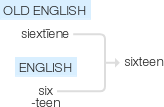Sixteen
Old English siextīene (see six, -teen).
wiktionary
From Middle English sextene, sixtene, from Old English siextīene, sixtēne, sixtyne, from Proto-Germanic *sehstehun. Cognate with West Frisian sechstjin, Dutch zestien, German sechzehn, Danish seksten.
etymonline
sixteen (adj., n.)
"1 more than fifteen, twice eight; the number which is one more than fifteen; a symbol representing this number;" Old English sixtyne, from siex (see six) + -teen. Similar formation in Old Frisian sextine, Middle Dutch sestien, Dutch zestien, German sechzehn, Old Norse sextan.
The age of the gods is always sixteen. Sixteen represents the number of perfection, of plenitude. In man it is after the sixteenth year that the first elements of decay begin to appear, and when the moon reaches the sixteenth digit it begins to decrease. [Alain Daniélou, "The Myths and Gods of India"]
From Latin contracted form sexdecim, sedecim come Italian sedici, French seize.
